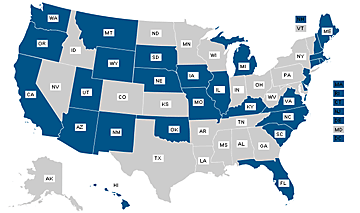Frequently Asked Questions About Voting in the summer 2011 Recall and Special Elections in Wisconsin
Do I have to show proof of identification/photo id to vote in recall or special elections this year?
No. The new “Voter Identification Act,” 2011 Wis. Act 23, does not require a voter to present proof of identification to vote until the Spring 2012 primary election and all elections thereafter.
However, election officials will ask voters to present proof of identification at elections prior to the Spring 2012 primary. A person who does not show proof of identification will still be able to vote, but will be given information about the new identification requirements. 2011 Wis. Act 23, § 144(2). There is no requirement that a person give a reason for not presenting proof of identification.
If you choose to show identification at elections this year, poll workers will compare the name on the identification to the name on the poll list to verify that the names “conform” to one another. Names may still “conform,” even if there are small differences, such as presence or absence of a middle initial, use of a shortened version of a first name (such as “Bob” for “Robert”) or variations of upper and lower case letters (such as “Maclane” for “MacLane”). GAB, Polling Place Voting Step-By-Step for All Elections Prior to 2012 February Primary (June 22, 2011). Poll workers will also compare the photograph on the identification to the voter’s appearance to verify that the photograph “reasonably resembles” the voter. ID. For all elections prior to the 2012 February Primary, there is no consequence if election inspectors believe the photo ID does not reasonably resemble the voter. Once photo ID is required in the February 2012 election, election inspectors will be instructed to challenge a voter if they believe a voter does not reasonably resemble the photograph on the identification presented.
I am not registered to vote. Can I register on election day?
Yes. The voter ID law did not change election-day registration. As long as you are at least 18 years of age, a U.S. citizen, have lived at your current address for 28 days, have proof of residence (see below), and are not serving a sentence – including imprisonment, probation, parole or extended supervision – for a felony conviction, you can register at the polls on election day. If you have a current and valid driver license, you will need to provide the license number on the registration form. Wis. Stat. § 6.33(1). If you do not have a current and valid driver license, you will have to provide your Wisconsin state identification card number or the last 4 digits of your social security number. If you do not have a current and valid driver license, state identification card or social security number, you will have to check a box saying you do not have any of these numbers, but you will still be allowed to register. You will also have to provide the location of your two “previous residence immediately before moving to” your current residence. Wis. Stat. § 6.33(1), as amended by 2011 Wis. Act 23, § 30.
I moved to my current address two weeks ago. Can I vote at the polling place for
my new address?
No. The new law requires a person to have lived in a ward or election district for 28 consecutive days prior to the election to be eligible to vote in that ward or district. Wis. Stat. § 6.02(1), as amended by 2011 Wis. Act 23, § 10. If you moved more recently than 28 days from another location in Wisconsin, you may vote at your previous polling place. Wis. Stat. § 602.02(2), as amended by 2011 Wis. Act 23, § 11. If you moved to Wisconsin from another state more recently than 28 days before any election in 2011, you may not vote in that election.
What documents will I need to register?
Any of the following documents are sufficient to prove residence, if they have your first and last name and your current street address:
• Current & valid Wisconsin driver’s license. Wis. Stat. § 6.34(3)(a)1.
• Current & valid Wisconsin state photo identification card. Wis. Stat. § 6.34(3)(a)2.
• An official identification card or license issued by a Wisconsin governmental entity. Wis. Stat. § 6.34(3)(a)3.
• An employer-issued photo identification card (not a business card). Wis. Stat. § 6.34(3)(a)4.
• A university, college or technical college identification card, along with either a receipt for tuition or fees paid within the previous 9 months or a certified list from the college or university of students currently living in student housing who are U.S. citizens. Wis. Stat. § 6.34(3)(a)7., as amended by 2011 Wis. Act 23, § 33m.
• A utility bill that is no more than 90 days old. Wis. Stat. § 6.34(3)(a)8.
• A bank statement. Wis. Stat. § 6.34(3)(a)9.
• A property tax bill or receipt from the past year. Wis. Stat. § 6.34(3)(a)5.
• A current residential lease in effect on election day. Wis. Stat. § 6.34(3)(a)6.
• A paycheck. Wis. Stat. § 6.34(3)(a)10.
• A check or other document issued by a unit of government. Wis. Stat. § 6.34(3)(a)11.3
Documents like credit card bills, collection notices, magazine subscriptions, personal mail and mail solicitations do not qualify for proof of residence.
I don’t have any of the documents for proving residence that are in my name. Can I have someone vouch for where I live?
No. Until the voter ID law passed, another eligible voter from your municipality who knew where you lived could “corroborate” your residence by signing a statement confirming where you live. The new law eliminates corroboration as proof of residence. See 2011 Wis. Act 23, § 17, amending Wis. Stat. § 6.15(2)(d)1r.
I heard that I will have to sign the poll list when I vote. Is that true?
Yes. If you are registered to vote before Election Day, there will be a box on the poll list for your signature. Wis. Stat. § 6.79(2)(a), as amended by 2011 Wis. Act 23, § 45. If you are unable to sign because of a disability, you can get an exemption from the signature requirement.
My signature changes all the time. Will the poll workers let me vote if my signature doesn’t look like it did when I registered?
Yes. The law does not require election officials to compare your signature on the poll list to the signature on your registration, the signature on your proof of identification or residency or to any other signature.
Can I vote in person before Election Day?
Yes. You can vote an in-person absentee ballot at your municipal clerk’s office or, in the City of Milwaukee, at the Election Commission Office starting the 3rd Monday before Election Day until 5 p.m. the Friday before Election Day. Wis. Stat. § 6.86(1)(b), as amended by 2011 Wis. Act 23, § 57. When you vote before Election Day in this way, your ballot is set aside for counting with other absentee ballots on Election Day. As with voting on Election Day, you will be asked, but not required, to show photo identification when you vote in person absentee in 2011. GAB, Major Impacts of the New Voter Photo ID Bill: Changes to the Election Process Effective Immediately at 3 (June 20, 2011). If you have not already registered, you may also register at the municipal clerk’s office before voting in person absentee. Wis. Stat. § 6.29(2)(a), as amended by 2011 Wis. Act 23, § 29.
Can I vote by mail?
Yes, you can cast an absentee ballot by mail. You can request an absentee ballot from the municipal clerk or election commission by mail, email or facsimile. Wis. Stat. § 6.86(1)(a). The application must be received by the municipal clerk no later than 5 p.m. the Thursday before the election. Wis. Stat. § 6.86(1)(b), as amended by 2011 Wis. Act 4 23, § 57. Municipal clerks will begin accepting in person applications for absentee ballots no earlier than the third Monday before the election. Id.
You may either vote the absentee ballot in the clerk’s office, or the clerk can mail it to you. If you request, the clerk must also send the ballot by email or facsimile. Wis. Stat. § 6.87(3)(d), as amended by 2011 Wis. Act 23, § 65.
You must return the completed ballot to the municipal clerk or election commission in a properly completed ballot envelope. The envelope will have a certification, which the voter and a witness (who is an adult U.S. citizen) must sign. Wis. Stat. § 6.87(2) & (4)(b)1., as amended by 2011 Wis. Act 23, § 66. The absentee ballot must be received by the clerk or election commission no later than 8 p.m. on election day. Wis. Stat. § 6.87(6). You can return the ballot in person or by mail, but remember that if you send it by mail it must arrive (not just be postmarked) by 8 p.m. on election day.
You must be registered in order to vote absentee, but you can register in person at the clerk’s office when you submit a request for an absentee ballot. You can also register by mail, but your registration must be postmarked no later than the third Wednesday before the election. Wis. Stat. § 6.28(1). You will not be sent an absentee ballot until you are registered and submit an absentee ballot request.
This document only deals with elections in 2011. When the voter identification requirement takes effect next year, a number of other questions will arise. Election Protection will produce a revised FAQ prior to elections in 2012.
 This blog post by ACLU staffer Allie Boehm was originally posted on the national ACLU's Blog of Rights.
This blog post by ACLU staffer Allie Boehm was originally posted on the national ACLU's Blog of Rights. 



